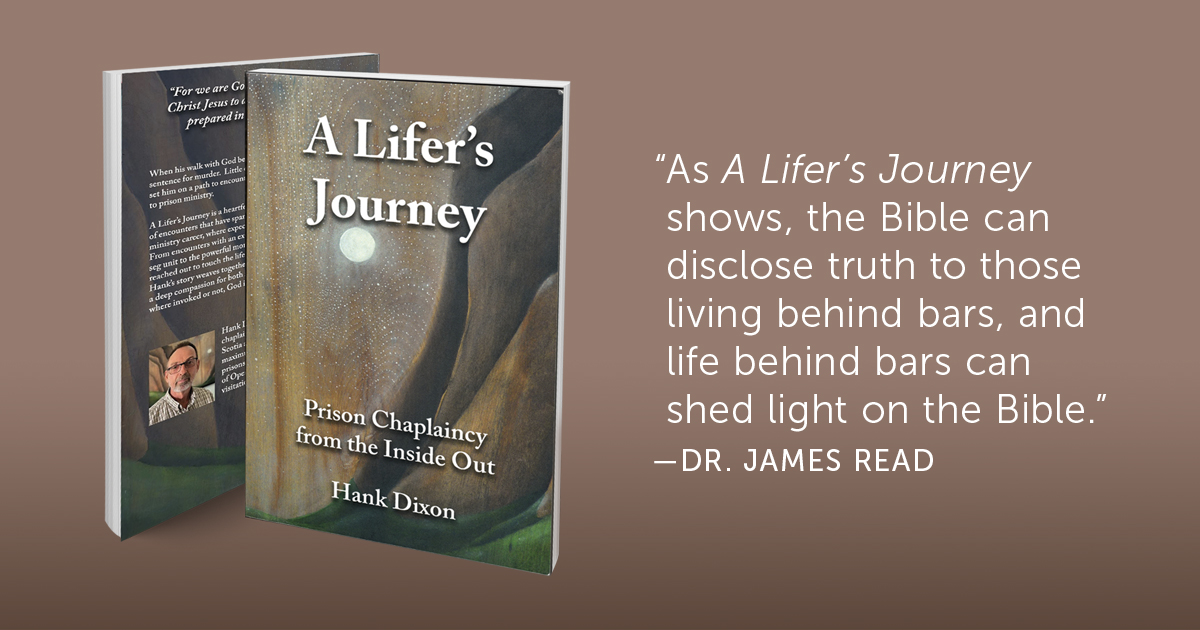By his own account, as a 19-year-old drug addict, Hank Dixon and an accomplice broke into a house and ransacked it, tied up the man who was there and beat him. Within an hour, the man was dead. As a result, Hank was convicted of second-degree murder and sentenced to life with no hope of parole for 10 years.
When he was released in 1985, the prison officer discharging him said, “You’ll be back!” And Hank did return—but as a chaplain, not a re-offender.
Page Turner
Details of Hank’s prison conversion and of his two decades as a prison chaplain are recounted in vivid detail in A Lifer’s Journey. In the pages of the book, there are stories of his dramatic first encounter with Jesus while a convict in prison, of his subsequent relapse into drugs and unbelief, and his recovery. There are engaging stories of his years as a prison chaplain, rubbing shoulders with inmates and prison guards.
We learn that the angels are not all on one side. We read of inmates who are honest, kind and self-aware as well as those who are deceitful and cruel. We read of chaplains who courageously speak the truth and speak it in love, and of chaplains who belittle inmates, alienate staff and exaggerate their own success. We read of prison riots and suicides, and of lives (like Hank’s own) that are turned from darkness toward light.
Birth of a Bond
Among the most heartwarming stories of God’s surprising grace is the story of Hank and Brian. As Hank said in his sermon at Brian’s funeral: “The first time I met Brian, it was in a small basement apartment in Edmonton. He was on the other end of a .38 revolver jammed into the back of my neck. His first words of greeting were not the warmest for the beginnings of a friendship. In a clear, powerful, no-nonsense voice, he declared, ‘Edmonton City Police. Don’t move. You’re under arrest.’ ”
Unlike many cops, Brian “stepped in to offer a measure of compassion and act with an integrity I did not expect.” Not just once and not just for a short span of time. Ex-con and retired cop developed a close 38-year-long bond.
God Is Present
Compelling as these stories are, Hank’s book is not just made up of stories. Hank also intends the book as counsel for those who want to be—those who, like him, are called to be—prison chaplains. It’s not easy work, he says. “In the midst of all this, watching the destructive claws of a prison culture and environment strip men of dignity, self-respect and any sense of security, a chaplain stands for the most part powerless, unable to do very much.”
What sustains him or her? Well, for one thing, says Hank, “theology matters.” The prison chaplain needs a theology that is robust enough to understand failure as well as victory, according to Hank, and a theology that can cast a light on self-deception and self-justification.
As A Lifer’s Journey shows, the Bible can disclose truth to those living behind bars, and life behind bars can shed light on the Bible. What Hank Dixon does with the gospel story of Jesus’ journey to Emmaus with two of his disciples after His Resurrection is worth the price of the book (see Luke 24:13-35). And at the heart of that story in which Jesus was present long before He was recognized, Hank finds the central good news message that, invoked or not, God is present.
Dr. James Read is the recently retired executive director of The Salvation Army Ethics Centre in Winnipeg and a recipient of the Order of the Founder, the Army’s highest award.








Leave a Comment